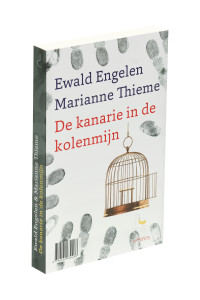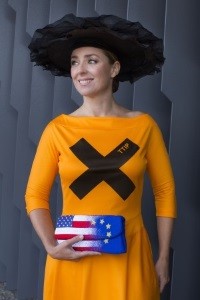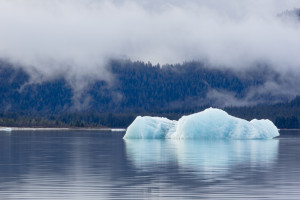Weltlog 18 April 2016
Am Sonntag, dem 10. April, war bereits der 22. Kongress unserer Partei. Mehr als 400 Mitglieder waren an diesem inspirierendem Tag mit dabei. Bei jedem Kongress fällt mir erneut auf, wie besonders es doch ist, dass Menschen mit so vielfältigen Hintergründen die Ideale unserer Partei teilen. Zusätzlich zu den üblichen Tagespunkten, wie dem Jahresbericht und der Jahresbilanz, gab Professor der finanziellen Geographie Ewald Engelen eine Gastlesung über seine Ansichten zur Bankenkrise. Er verglich das durch und durch verrottete Finanzsystem mit der Art und Weise, wie die Lebensmittelversorgung organisiert ist, mit all ihren Lebensmittelskandalen, wie z.B. dem Betrug mit Pferdefleisch. Er erzählte auch, wie er von einem überzeugtem Fleischesser zu einem Vegetarier wurde. Gemeinsam mit Ewald habe ich das neue Buch “Der Kanarienvogel in der Kohlengrube” geschrieben.

Der Kanarienvogel in der Kohlengrube vereint unsere Ansichten über Ökonomie und Ökologie. Unser Buch wird diese Woche in den Niederlanden veröffentlicht. Für international Interessierte wird es eine englische Version geben, in Form eines E-books. Das wird Anfang Mai erwartet, ich sage Ihnen Bescheid!
In meinem letzten Worldlog habe ich über das Referendum berichtet, das am 6. April in den Niederlanden gehalten wurde und bei dem Niederländer für oder gegen den Freihandelsvertrag zwischen der EU und der Ukraine abstimmen konnten. Ich habe mit meiner Partei kräftig gegen den Vertrag Kampagne geführt und bin darum auch froh, dass eine Mehrheit der Menschen ebenfalls dagegen gestimmt haben. Ich bin der Meinung, dass unsere Regierung, die dafür ist, dieses Ergebnis nicht ignorieren darf. Letzte Woche gab es eine Debatte in der zweiten Kammer des Parlaments und ich habe erneut daraufhin gewiesen, dass ein Nein auch tatsächlich Nein bedeuten muss, der Vertrag also nicht ratifiziert werden darf.
Ich habe eher bereits bei der Regierung darauf gedrängt, ein Referendum über TTIP abzuhalten. Mein Antrag wurde damals abgewiesen. Das Ergebnis des Referendums über den Freihandelsvertrag mit der Ukraine macht allerdings deutlich, dass eine Mehrheit der Wähler Freihandelsverträgen kritisch gegenüber stehen. Darum habe ich erneut einen Antrag für ein Referendum, ob TTIP erwünscht ist, gestellt. In der Woche vom 25. April wird hierüber abgestimmt.

‘Was hat man von Geld, wenn die Eiskappe schmilzt?’ War der Titel meines Beitrags, bei der Debatte über die arktische Region. Wir wollen, dass sich die Regierung voll für den Schutz des Nordpols einsetzt. Für den Südpol kämpft die Regierung für optimalen Schutz, aber beim Nordpol scheint wirtschaftlicher Gewinn über die verletzliche Natur und Umwelt gestellt zu werden.
Denn trotz meines, vom Parlament 2014 angenommenen Antrags, die Arktis von Öl und Gasgewinnung zu verschonen, scheint die Regierung sich auf die Entwicklung von wirtschaftlichen Möglichkeiten im Nordpolgebiet zu richten. Die Regierung will sogar aktiv die Interessen niederländischer Unternehmen unterstützen, die Geld verdienen können bei Öl und Gasbohrungen die stattfinden können, jetzt wo sich der Nordpol aufwärmt.

Die Regierung will alles was schön, unberührt und bedeutungsvoll ist beschützen, nur nicht wenn Geld im Boden steckt. Die Regierung hat die Verantwortung, den Schutz vor weiterer Erwärmung und Verschmutzung der Arktis und des gesamten Planeten zur Priorität zu machen. Es gibt keine anderen Interessen, die schwerer wiegen.
Das war alles für heute, bis zum nächsten Mal!
Herzlicher Gruß,
Marianne
On Sunday the 10th of April, we celebrated our Party´s already 22th congress. More than 400 members were present on this inspiring day. Every congress it is remarkable to see people of so many different backgrounds sharing our party’s ideals. In addition to the customary items such as an annual report and annual financial accounts, Professor of Financial Geography Ewald Engelen gave a guest lecture on his views of the banking crisis. He compared the thoroughly rotten financial system to the way our food supply, with its many food scandals including the horse meat fraud, is organised. He also talked about how he had shifted from being a confirmed meat-eater to being a vegetarian. Together, Ewald and I have written our new book De Kanarie in de Kolenmijn (The Canary in the Coal-mine).

In De Kanarie in de Kolenmijn, our visions on economics and ecology meet. As of this week, our book will be sold in the Netherlands. An English version in the form of an e-book will also be published specially for our international readers. This e-book is expected to come out in the beginning of May, so I will keep you informed!
In my last Worldlogs, I have written about the referendum that was held in the Netherlands on 6 April. With this referendum, the Dutch people were able to indicate whether they were in favour of or against the trade agreement between the EU and Ukraine. Together with our party members, I have campaigned strongly against this agreement and I am therefore glad that a majority of the Dutch citizens has also voted against. I think that our government, which is in favour of the treaty, may definitely not ignore the result of this vote. Last week, during a debate in the Lower House, I have indicated once again that a no vote by the Dutch people should literally mean no, and the treaty should therefore not be ratified.
Earlier I have urged our government to hold a referendum on TTIP, but my request was denied. The result of the referendum on the EU/Ukraine treaty shows us that a majority of our voters are critical of free trade agreements. That is why I have once again tabled a motion for a referendum on the desirability of TTIP. It will be put to the vote during the week of 25 April.

“What good will money do you when the icecaps are melting?” That was the title of my contribution to the debate on the Arctic Region last week. We want to see the government fully commit itself to the protection of the North Pole. The Dutch government is fighting for optimum protection of the South Pole, but when it comes to the North Pole, economic gain seems to be put above the fragile wildlife and environment.
After all, despite the fact that the Lower House carried my motion of 2014 on safeguarding the Arctic Region against oil and gas extraction, the government still seems to be focusing on developing economic opportunities in the Arctic. The government is even planning on taking an active role in looking after the interests of Dutch companies that will make money from oil and gas drilling, which has now become possible due to the warming of the North Pole.

The government is willing to protect all that is beautiful, unspoiled and meaningful, expect when there is money in the ground. The government should make the protection of the Arctic Region and the entire planet against further warming and pollution its priority. No other interest can be of more importance.
That’s it for now, until next week!
Kind regards,
Marianne